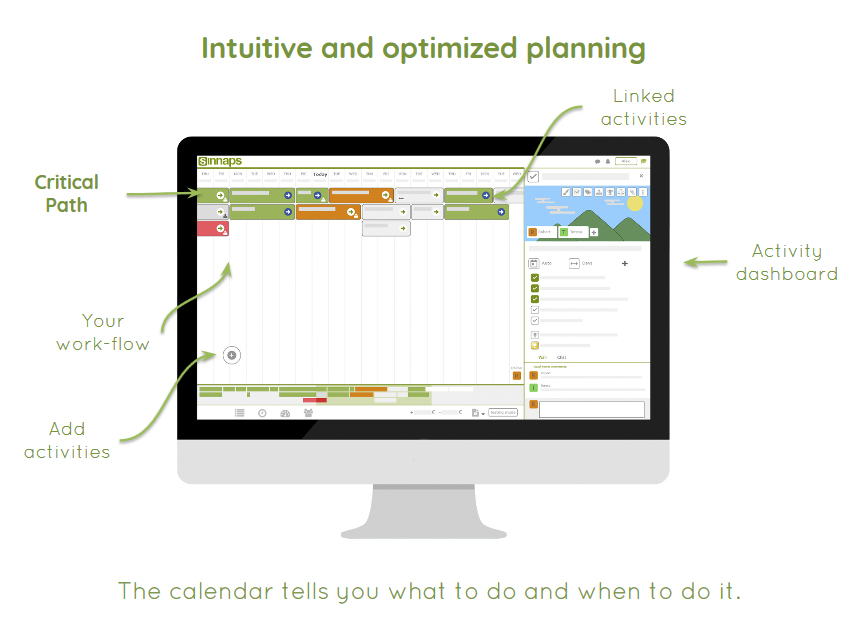Coaching and mentoring are both significant practices carried out by many organisations today. Coaching and mentoring tips therefore are in high demand. In this article you will receive some tips, learn about difference between coaching and mentoring with examples, coaching strategies and how specific tools available through Sinnaps project management app can help coaching and mentoring in an organisation.

Índice
The Difference Between Coaching and Mentoring
In terms of coaching versus mentoring, there are a few key differences to consider. To understand what coaching and mentoring is, let’s take a look at some of the main differences between the two practices:
- Mentors can have a long-lasting relationship with the people that they are mentoring, whereas coaches tend to coach for a set period of time.
- Meeting with your mentor can be more informal, sometimes sporadic when the person they are mentoring might need some guidance or advice, this is where mentoring resources are focused. Coaching meetings tend to be more structured and scheduled.
- Mentoring activities can focus on the long-term objectives of a mentee, whereas the coaching process tends to focus on the shorter-term objectives of the person being coached.
- Mentors are more qualified that the people that they are mentoring, whereas coaches can be on the same level as the people they are coaching, unless there is a need to coach on specific skillsets.
- Coaching and mentoring employees in the workplace are important. With mentoring, the focus is more on personal development and career development, whereas coaching tends to focus on specific areas in the person’s working life.
- The mentee sets the agenda of their mentoring plan and what they want to focus on. Coaching methods focus more on specific goals.
5 LESSONS TO TRAIN YOU TO BE A PROJECT MANAGER
Free online Project Management course

Coaching and Mentoring Skills
Coaching and mentoring require specific skillsets to be more effective and to give a valuable experience to the mentee or coachee.
Coaching skills:
- Goal-setting: Coaching is goal orientated and goals require careful planning. Sinnaps offers an easy to use, accessible planning platform that can be used by a coach and their coachee.
- Listening
-
Empathising
-
Questioning
- Giving feedback. With Sinnaps project management software giving feedback is simple with tools such as live in-chat features and weekly progress reports.
- Intuition
- Checking on how progress is coming along.
Mentoring skills:
- Open mindedness
- Active listening
- Questioning and looking at situations from a different perspective
- Honesty and transparency
- Self-awareness
- Deep reflection
GET STARTED NOW

Coaching Styles
There are three main types of coaching styles that coaches can practice, depending on the coaching context and the needs of the coachee:
- Autocratic: This style involves the coach making all the decisions and the coaches doing what they are told. It is a very disciplinarian and controlling style. This is usually the case for coaches that have a lot of experience and are highly knowledgeable in the area that they are coaching.
- Democratic: This style involves both the coach and the coachee participating in decision making on the goals or how they will be achieved. The coach acts as a guide and a leader.
- Laissez-faire: With this style, the coach makes very few decisions. The main focus is on influencing and teaching the coachee in areas that they are unsure of, but otherwise the coachee tends to be in control.
Coaching Models
Coaching models such as the GROW and FUEL models acts as frameworks that coaches can follow. These models serve as structures to follow and allow coaches to strategically plan their coaching and how aims and goals will be achieved. These models help coaches to adequately respond to any situation.
Management Coaching and Mentor Tips
- Most coaching articles will tell you about the importance of setting ground rules so that everyone is on the same page.
- Coaching and mentoring in business requires a clear understanding of the issues that need to be resolved.
- A coaching or a mentoring plan should include key milestones to achieve, just like Sinnaps project planning app identifies and highlights the key milestones of a project.
- Coaching strategies should focus on what the individual requires.
- Any examples of coaching and mentoring in the workplace will include a technique for measuring success. This should be one of the first aspects to agree upon, very reminiscent of a project scope plan- that you can create easily with Sinnaps.
- The role of a mentor in the workplace and a coach does not end with helping people. They should also take the time to self-evaluate and reflect upon their experiences.
Coaching Techniques
-
- Collaborate with your coachee.
- Reflection journals are a good idea to keep track of progress.
- Use communication tools: Clear and consistent communication is essential to reaching goals. Sinnaps understand this and offers various communication tools such as a live in-chat feature and a project wall.
- Focus on core values.
- Understand biases that may exist.
- Identify risks and opportunities: Risk management, such as the bottleneck identifier available with Sinnaps, allows for preparation.
The benefits of coaching and mentoring in the workplace are numerous. Employees and team members feel more valued and motivated as a result. Coaching and mentoring helps to increase productivity and efficiency and it is seen as an investment into your workforce. See how Sinnaps can help you with your coaching and mentoring ambitions with the tools it offers as part of the project management app.
We love hearing your opinion and helping you in any way we can. Be sure to give this article a like if you enjoyed it and feel free to leave a comment with any questions or opinions that you have! 😊
Some recommendations…

